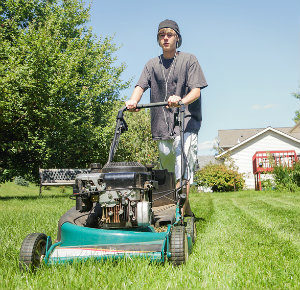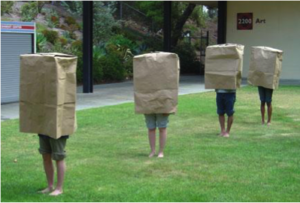A Caring Principal’s Tips for Lawnmower Parents
A MiddleWeb Blog

It is about being a parent. It is not a spoiler to share that the main character gives birth to an egg from which hatches a lizard. That little lizard is showered with unconditional love by its mother and all of the other humans who live in her circle.
John was right. I did love the story. But, as with any text, I read and understood it in the context of the thoughts currently swirling around my brain. And what was on my mind was how to deal with unsupportive parents, helicopter parents, and the newest concerning type of parent, the lawnmowers.
Lawnmower parents are those parents who clear the way for their kiddos. If we were playing the $100,000 Pyramid, the following would be clues for the answer, “Things lawnmower parents might say.”
Forgot your lunch? I’ll run it to the school for you. I’ll just call my boss and tell him I’m going to be late for work.
- What? That teacher gave you a ‘B’? I will call her and give her a piece of my mind and you’ll have your ‘A’!
- My son? No, he doesn’t ever act like that at home. It must be someone else’s fault.
Now, clearly, this kind of lawn mowing is not good for kids. When the path is always cleared for them, they never learn how to clear it for themselves, how to fight for what they need or to accept what they have. They don’t learn to work hard or to be comfortable with themselves as less than perfect (something we all are, right?!).
So back to the lizard baby story. The mother wants the best for her kid. I get that. I’m a mom. I want the best for mine too. She is worried about her child’s future because his looks and behavior are so different from those of others. So, she clears the path for him (it?). When the lizard baby causes problems for friends and family, his actions are excused and explained away. The house is transformed to fit the kid’s needs and all eyes turn to adore the little lizard.
Right around the time I read this story, I heard the following from an assortment of well-meaning parents – parents who really want to do the best they can by their kids and themselves but who were mowing lawns.
- We just didn’t have time to get his work done last week. Can you let him turn it in late and not penalize him?
- My son doesn’t like to go out for recess. Can’t he stay in the library?
- Our daughter is bored in class; we think she is a genius. Can you please not make her learn her division tables? She would like something more creative.
- Why did my son get a detention for pushing that kid down? He told me that that kid bothers him all the time.
My motto is “start with love, end with love,” and I work VERY hard to always assume best intentions and be nonjudgmental, but, man-oh-man, it can be challenging.
I think it is incumbent on educators to help parents learn that they cannot continue to clear the path for their kids. Why? Because all of our babies are lizard babies! They are all special. Which, in a profound way, means none of them are more special than any others.
As I tell my staff, I’m less interested in problems than in finding solutions. So below are some things I am trying in hopes of helping parents stop mowing lawns for their sweet lizards and in hopes of helping lizards be, well, less lizardy.
No More Mowing by Parents
To help parents in my community learn about the downsides of clearing the way for their kids and the benefits of allowing them to embrace their own struggles, I do the following:
1. Educate. In simple ways I try to get information out to the parents I serve. When I posted an article on the effects of mowing lawns for kids, it sparked great online conversation. So did articles I shared on the inadvertent ill effects of over-praising children, and the powerful good that can come from allowing our children to struggle and even fail.

Later, that mom wrote me a thank-you note saying, “I got a lot out of the meeting and I loved it. The part when you said I was being selfish by not getting after my kids, because I didn’t want to be uncomfortable was my lightbulb moment.”
3. Stay True to My Decisions. I don’t give in at the first inkling that a parent is unhappy with me. In a previous Heart of the School post, I wrote about how I use my core values and the school mission to guide my decisions. I am careful and thoughtful before laying down rules, policies, and decisions that impact folks’ lives.
But, once I make a tough call, I stick with it. For example, after there were several injuries on the playground due to overly aggressive football games, I banned football at recess for a month. Almost immediately, I had parents calling to tell me to tell me that I was ruining school (I am totally not exaggerating!). But I didn’t change my mind and I truly don’t think anyone’s life has been ruined.
Passing the Mowing to the Kids
There are two major players in a child’s life – parents and teachers. Below are strategies for both to try as we work to help young people do their own mowing.
Parents
1. If Something Needs To Be Said, YOU Say It, Kiddo! As parents, we are hardwired to protect our kids. Our very nature pushes us to rush in and rescue them. But we’ve got to put that in check, to go a little old school with the parenting. Let your kids solve their own problems. If they need to talk to a teacher about missing work, coach them, role play the conversation, but don’t make that phone call for them.

3. Be Honest. Tell your kids about your own struggles. Telling children about how life can sometimes be hard for you but explaining how you move through the difficulties can be inspirational.
My own kids once accused me of not really working because I “just spend all day in school having fun!” After taking a deep breath and muttering to myself, I told my kids the story of how a superintendent once hauled me into his office. slammed his fist down on his desk, and yelled (literally yelled) at me for speaking up at a meeting on why I felt having a social media presence could be important for our district. The point? I got over it and moved on.
4. Quit Grade Checking. Oh, PowerSchool, how I hate thee, let me count the ways…. Well, I don’t totally hate it as a way to keep records and record grades. But I do hate how it and similar online gradebooks encourage parents to constantly look over the shoulder of their children.
Read about the Downside of Checking Kids’ Grades in this great post from the New York Times. (The writer, Jessica Lahey, is a teacher and author of an NYT bestseller The Gift of Failure.) Then, if you are going to use the online grade book to check on your child, don’t do it too frequently. It could increase your inclination to jump in and fix problems for your children that they can and should be fixing themselves.
Teachers

Silly? Maybe. But there seems to be an increasing number of kids who can’t meet their own needs. We have to teach them to see they are more powerful than they realize. The paper bag tale is a good entry point to help kids think and talk about their self-efficacy.
2. Goal Setting. Helping students learn to set, self-monitor, and meet goals is a great way to empower them so that they understand that they have the ability to impact their own growth and be independently successful. At my school, we talk about having a commitment to helping ALL students make a year’s growth in a year’s time. We focus our work with goals in reading and math and expect learners who are on grade-level, above grade-level, and below grade-level to work hard and grow, no excuses.
3. Allow for Failure (or at least struggle). This tip is indelibly tied to both Tip 1 and Tip 2. We have to stop rescuing kids so quickly. Struggle and even “failure” are a natural part of growth and progress. Don’t hold back because the work might be hard.
I was recently in a master teacher’s classroom and one of the things I noticed was that this teacher called on all of her kids, even though I was in the room, furiously typing notes for her evaluation. She did not shy away from kids who she thought might not know the answer. She wanted them to know that they were on the hook for learning and that she supported them in their efforts and truly believed they could be successful.
My husband, (remember, the guy who told me to read Lizard Baby) often reminds me (and my kids) that crying is normal and natural in children, and that instead of seeking to rescue kids when they cry by giving them easier tasks or less work, we should empathize with them, offer a modicum of help and a ton of love and encouragement, and then when they do something that was hard, celebrate with them.
It Really Is About Love!
I know that some folks reading this post will think I’m crazy and that I am the kind of hard nosed, unfeeling teacher that Arnold Schwarzenegger was at the beginning of Kindergarten Cop, the kind that tells kids, “I’ve got news for you…you’re not going to have your Mommies behind you wiping your little tushies!”
Not so. I am a full-blown nurturer and delight in my time spent with children big and small. I love them enough to advocate for what’s best for them, even when that’s hard (for them or for me).
What do you think? Reach out and share your own thoughts and ideas in the comments. But be civil, please! (Watch for my post here on respectful discourse among educators, coming soon!)

 Forgot your lunch? I’ll run it to the school for you. I’ll just call my boss and tell him I’m going to be late for work.
Forgot your lunch? I’ll run it to the school for you. I’ll just call my boss and tell him I’m going to be late for work. 
































This is a great article! It covers a widespread problem and gives smart, practical ways to help. Failing and stumbling on the uncleared path are so necessary to practicing a growth mindset and developing grit that will help kids all through their lives. Excellent piece!
I am so glad you enjoyed the article, Dr. R! Praise from you means a great deal to me. Thank you!
I agree – enlightening (and timely) read! I was introduced to the term “lawnmower parent” this year. I’m wondering if you’ve experienced negative feedback from parents when you have addressed this kind of situation. It seems like a fine line. I had a parent express frustration that I was trying to tell him how to parent. As this seems to be becoming a more common phenomenon, I’d like to be prepared moving forward.
Great question! I haven’t felt much negative feedback. But, I’ve been at the same school for 8 years and know the community really well. Folks know I am open and honest. They also know I love them and their kiddos. Also, I am always REALLY clear that I will support them and their kiddos no matter if they agree with me or not. :) My motto: Start and end with love.
Thank you!